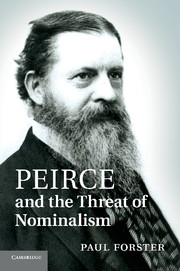Book contents
- Frontmatter
- Contents
- Preface
- List of abbreviations
- 1 Nominalism as demonic doctrine
- 2 Logic, philosophy and the special sciences
- 3 Continuity and the problem of universals
- 4 Continuity and meaning: Peirce's pragmatic maxim
- 5 Logical foundations of Peirce's pragmatic maxim
- 6 Experience and its role in inquiry
- 7 Inquiry as self-corrective
- 8 Theories of truth: Peirce versus the nominalists
- 9 Order out of chaos: Peirce's evolutionary cosmology
- 10 A universe of chance: foundations of Peirce's indeterminism
- 11 From inquiry to ethics: the pursuit of truth as moral ideal
- Bibliography
- Index
1 - Nominalism as demonic doctrine
Published online by Cambridge University Press: 28 April 2011
- Frontmatter
- Contents
- Preface
- List of abbreviations
- 1 Nominalism as demonic doctrine
- 2 Logic, philosophy and the special sciences
- 3 Continuity and the problem of universals
- 4 Continuity and meaning: Peirce's pragmatic maxim
- 5 Logical foundations of Peirce's pragmatic maxim
- 6 Experience and its role in inquiry
- 7 Inquiry as self-corrective
- 8 Theories of truth: Peirce versus the nominalists
- 9 Order out of chaos: Peirce's evolutionary cosmology
- 10 A universe of chance: foundations of Peirce's indeterminism
- 11 From inquiry to ethics: the pursuit of truth as moral ideal
- Bibliography
- Index
Summary
The question of whether laws and universals are real is central to Peirce's philosophy. He thinks the division of philosophers into realists – who think there are real laws and universals – and nominalists – who think laws and universals are merely products of the mind – cuts across more familiar contrasts between rationalists and empiricists, naturalists and transcendentalists, and so affords a novel perspective on the philosophical tradition. More provocatively, Peirce views realists as allied with a medievalist – Duns Scotus – against ‘all modern philosophers’ (SS: 115, 1909). Yet this alliance is dedicated to the advancement of scientific philosophy, not its overthrow. So positioned, Peirce's realism is a revolutionary doctrine as well.
Still, it is not obvious why Peirce should view the question of the ontological status of laws and universals as fundamental to philosophy. Nor is it obvious what there is in so abstract a question to elicit the contempt he directs towards his nominalist adversaries. Peirce insists that a pragmatist ‘will be the most open-minded of all men’ (5.499, c. 1905), yet this does not stop him from denouncing nominalism as ‘the most blinding of all systems’ (5.499, c. 1905), a ‘disgraceful habitude’ (6.175, 1906) and a ‘philistine line of thought’ (1.383, c. 1890). He declares nominalism ‘a protest against the only kind of thinking that has ever advanced human culture’ (3.509, 1897) and ‘deadly poison to any living reasoning’ (NEM 3: 201, 1911).
- Type
- Chapter
- Information
- Peirce and the Threat of Nominalism , pp. 1 - 12Publisher: Cambridge University PressPrint publication year: 2011



